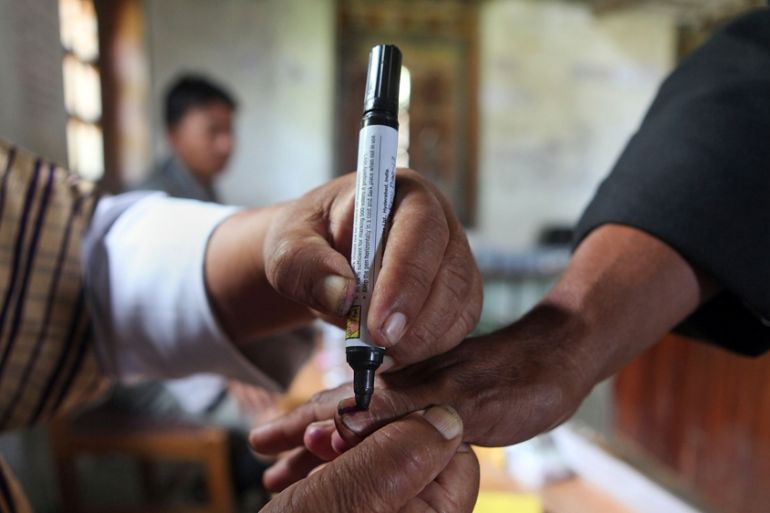Bhutan votes in the country’s third general polls
Voters cast their ballots to decide which party will lead the young democracy for the next five years.

Voters in the tiny Himalayan nation of Bhutan have cast ballot in the country’s third general elections.
A total of 438,663 registered voters chose candidates on Thursday for the 47-member National Assembly, or lower house of parliament, Election Commission secretary Dawa Tenzin said.
Keep reading
list of 4 itemsLawrence Wong set to take centre stage as Singapore’s new prime minister
Key takeaways as ex-Trump lawyer Michael Cohen testifies in New York trial
Will Israel’s war on Gaza sway South Africa’s election?
NA General Election 2018: An elderly couple in Dagana walked two long hours to get to their polling station. The woman is 77-year-old and her husband is 80. This is the spirit of Bhutanese voters! pic.twitter.com/dkNTtycMi7
— Bhutan Broadcasting (@BBSBhutan) October 18, 2018
Streets in the capital were mainly empty for the occasion as authorities declared a holiday for the election.
Many voters looked forward to seeing a new government tackling problems including the country’s large foreign debt, mainly owed to India.
“We expect a new broom to sweep well,” said engineer Gopal Chettri, to news agency AFP, after voting in the capital Thimphu.
“It is a country with a limited budget so what can you say. Whatever party wins has to cope with it.”
Reporting from Bhutan, Al Jazeera’s Neave Barker said it is only the third election since the country transitioned to democracy in 2008.
“It has been a very unusual journey because the transition came about as a result of a direct order by the previous monarchs. So, people have embraced democracy enthusiastically, perhaps largely out of respect for the monarchy. That is the bizarre contradiction about politics here in Bhutan,” he said.
#Bhutan: Polling for 47 seats of National Assembly, lower house of parliament underway pic.twitter.com/oLpMM0hZGM
— DD News (@DDNewslive) October 18, 2018
The primary round held in September resulted in a surprise defeat for the ruling People’s Democratic Party of Prime Minister Tshering Tobgay.
Druk Nyamrup Tshogpa (DNT) narrowly led voting with 92,722 votes.
Economic issues rank high in the campaign manifestos of both parties. Despite impressive growth of 7.5 percent in 2017, Bhutan faces high unemployment and rising external debts.
The Buddhist kingdom held its first general election in March 2008, marking the end of a century-old monarchy.
The hereditary king remains as constitutional head of state but has to retire by age 65 and can be removed by a two-thirds majority of parliament.
Counting will begin immediately and the results will be formally declared on Friday morning.
Bhutan has tried to protect itself from globalisation, striving for Gross National Hapiness over GDP growth, and maintaining a carbon-negative economy.
“At the centre of all political life in Bhutan is the pursuit of the domestic national happiness. That is how the success of a nation is measured,” Barker said.